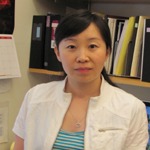CURRICULUM VITAE

Qi Wang, Ph.D.
Assistant Professor
Department of Pathology and Laboratory Medicine
Medical University of South Carolina
Charleston, SC 29425, USA
843-876-2214 (Office)
Email:wangq@musc.edu
EDUCATION AND TRAINING
Institution and Location Degree Years Field of study
Fudan University, Shanghai, China B.Sc. 07/1995 Biology
Harbin Medical University, Harbin, China M.Phil. 07/2001 Medical Genetics
Harbin Medical University, Harbin, China Ph.D. 07/2004 Medical Genetics
H. Lee Moffitt Cancer Center, Tampa, FL, USA Postdoc 02-2007 Cancer Biology
Dana-Farber Cancer Institute, Boston, MA, USA Postdoc 10-2013 Cancer Biology
POSITION AND HONORS
Positions
2013-2014 Scientist, Department of Cancer Biology, Dana-Farber Cancer Institute, Harvard Medical School, Boston, MA, USA.
2014-Present Assistant Professor, Department of Pathology and Laboratory Medicine, Medical University of South Carolina, Charleston, SC, USA.
Honors
2001-2002 United Medical Scholarship, Harbin Medical University, China.
2002-2003 Cheng Yu-Tung Research Fellowship, The University of Hong Kong, Hong Kong.
2002-2005 Science and Technology Award, Department of Education, Heilongjiang province, China.
2003-2004 Science and Technology Award, Government of Heilongjiang province, China.
2004-2005 National Science and Technology Award, Department of Education, China.
2006 Superior Poster Presentation Award in Women’s Health Science Research, H. Lee Moffitt Cancer Center, Tampa, FL, USA.
2013 The Best Mature Project Award, Department of Cancer Biology, Dana-Farber Cancer Institute, Boston, MA, USA.
SELECTED PUBLICATIONS
1. Wang Q, Wang B, Guan X, Gao H, Cheng H, Zhang Q, Huang C, Li P, Fu.S. Analysis of comparative genomic hybridization and loss of heterozygosity in 43 primary gastric carcinomas. Chin Med J (Engl). 2003 Apr; 116(4): 517-23.
2. Li HM, Zhuang ZH, Wang Q, Pang JC, Wang X, Wong HL, Feng H, Jin DY, Ling MT, Wong YC, Eliopoulos AG, Young LS, Huang DP, Tsao SW. Epstein-Barr virus latent membrane protein 1 (LMP1) upregulates Id1 expression in nasopharyngeal epithelial cells. Oncogene 2004; 23:4488-94.
3. Wang Q, Tsao SW, Fu S, Xue W, Meng X, Feng H, Wong YC and Wang X. Overexpression of Id-1 in gastric adenocarcinoma: implication for a novel diagnostic marker. Anticancer Research 2004; 24:881-6.
4. Cheung HW, Chun AC, Wang Q, Deng W, Hu L, Guan XY, Nicholls JM, Ling MT, Wong YC, Tsao SW, Jin DY, Wang X. Inactivation of human MAD2B in nasopharyngeal carcinoma cells leads to chemosensitization to DNA damaging agents. Cancer Res 2006; 66:4357-67.
5. Wang Q, Tsao SW, Nicholls JM, Ooka T, Cheung HW, Fu S, Wong YC and Wang X. Anti-apoptotic role of Barf1 in gastric cancer cells. Cancer Letter 2006; 238:90-103.
6. Zhang X, Ling MT, Wang Q, Lau CK, Leung SC, Lee TK, Cheung AL, Wong YC, Wang X. Identification of a novel inhibitor of differentiation-1 (ID-1) binding partner, caveolin-1, and its role in epithelial-mesenchymal transition and resistance to apoptosis in prostate cancer cells. J Biol Chem 2007; 282:33284-94.
7. *Zhang X, *Wang Q, Ling MT, Wong YC, Leung SCL, Tsao SW, Wang X. Anti-apoptotic role of TWIST and its association with AKT pathway in mediating Taxol resistance in nasopharyngeal carcinoma cells. Int J Cancer 2007; 120:1891-8.*These authors contributed equally to the work.
8. Cheng GZ, Chan J, Wang Q, Zhang W, Sun CD, Wang LH. TWIST transcriptionally upregulates AKT2 in breast cancer cells leading to increased migration, invasion and resistance to Paclitaxel. Cancer Res 2007; 67:1979-87.
9. Cheng GZ, Zhang WZ, Sun M, Wang Q, Coppola D, Mansour M, Xu LM, Costanzo C, Cheng JQ, Wang LH. Twist is transcriptionally induced by activation of STAT3 and mediates STAT3 oncogenic function. J Biol Chem 2008; 283:14665-73.
10. Li Y, Zhang Q, Tian R, Wang Q, Zhao JJ, Iglehart JD, Wang ZC, Richardson AL. Lysosomal transmembrane protein LAPTM4B promotes autophagy and tolerance to metabolic stress in cancer cells. Cancer Res. 2011; 71:7481-9.
11. Utemark T, Rao T, Cheng H, Wang Q, Lee SH, Wang ZC, Iglehar JD, Roberts TM, Muller WJ, Zhao JJ. The p110α and p110β isoforms of PI3K play divergent roles in mammary gland development and tumorigenesis. Genes Dev. 2012 Jul 15; 26(14): 1573-86
12. Wang Q, Von T, Bronson R, Ruan M, Mu W, Huang A, Maira SM, Zhao JJ. Spatially distinct roles of class Ia PI3K isoforms in the development and maintenance of PTEN hamartoma tumor syndrome. Genes Dev. 2013 Jul 15; 27(14): 1568-80.
13. Gruber Filbin M, Dabral SK, Pazyra-Murphy MF, Ramkissoon S, Kung AL, Pak E, Chung J, Theisen MA, Sun Y, Franchetti Y, Shulman DS, Redjal N, Tabak B, beroukhim R, Wang Q, Zhao J, Dorsch M, Buonamici S, Ligon KL, Kelleher JF, Segal RA. Coordinate activation of Shh and PI3K signaling in PTEN-deficient glioblastoma: new therapeutic opportunities. Nat Med 2013 Nov; 19(11) 1518-23.
14. Wang Q, Weisberg E, ZhaoJJ. The gene dosage of class Ia PI3K dictates the development of PTEN hamartoma tumor syndrome. Cell Cycle. 2013 Dec 1; 12(23): 3589-93.
15. Schmit F, Utermark T, Zhang S, Wang Q, Von T, Roberts T.M and Zhao J. PI3K isoform dependence of PTEN-deficient tumors can be altered by the genetic context. Proc Natl Acad Sci U S A, 2014 Apr 29; 111(17): 6395-400.
RESEARCH SUPPORT
Start-up Fund12/01/14-11/30/19
Department of Pathology and Laboratory Medicine, Medical University of South Carolina,
Role: PI
 中文版
中文版

 中文版
中文版
